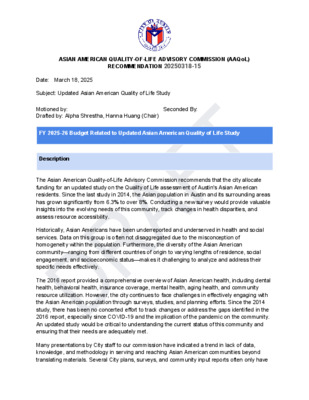Item 15: Draft Recommendation — original pdf
Backup

ASIAN AMERICAN QUALITY-OF-LIFE ADVISORY COMMISSION (AAQoL) RECOMMENDATION 20250318-15 Date: March 18, 2025 Subject: Updated Asian American Quality of Life Study Motioned by: Drafted by: Alpha Shrestha, Hanna Huang (Chair) Seconded By: FY 2025-26 Budget Related to Updated Asian American Quality of Life Study Description The Asian American Quality-of-Life Advisory Commission recommends that the city allocate funding for an updated study on the Quality of Life assessment of Austin's Asian American residents. Since the last study in 2014, the Asian population in Austin and its surrounding areas has grown significantly from 6.3% to over 8%. Conducting a new survey would provide valuable insights into the evolving needs of this community, track changes in health disparities, and assess resource accessibility. Historically, Asian Americans have been underreported and underserved in health and social services. Data on this group is often not disaggregated due to the misconception of homogeneity within the population. Furthermore, the diversity of the Asian American community—ranging from different countries of origin to varying lengths of residence, social engagement, and socioeconomic status—makes it challenging to analyze and address their specific needs effectively. The 2016 report provided a comprehensive overview of Asian American health, including dental health, behavioral health, insurance coverage, mental health, aging health, and community resource utilization. However, the city continues to face challenges in effectively engaging with the Asian American population through surveys, studies, and planning efforts. Since the 2014 study, there has been no concerted effort to track changes or address the gaps identified in the 2016 report, especially since COVID-19 and the implication of the pandemic on the community. An updated study would be critical to understanding the current status of this community and ensuring that their needs are adequately met. Many presentations by City staff to our commission have indicated a trend in lack of data, knowledge, and methodology in serving and reaching Asian American communities beyond translating materials. Several City plans, surveys, and community input reports often only have the staff or marketing resources to translate documents but the use of translated materials by the communities they are targeting is not currently tracked either. 2016 Asian American Quality of Life Study final report Currently, there is a unique opportunity to work with the University of Texas at Austin’s School of Social Work to update the study. Dr. Shetal Vohra-Gupta has proposed and attained $25,000 to update the survey and conduct a small pilot for validation. She and a doctorate-level student have presented to the AAQoL what the pilot study would look like along with a proposal for the roll-out of the survey. Recommendation The Commission recommends that the city allocate $200,000 in funding for the upcoming Asian American Quality of Life study update. This amount reflects the anticipated changes in methodology and data collection for the updated survey. It allocates funding for two Master's level students and one PhD student to work with the primary researcher in the study. The study participant incentives will be increased to $20, up from the previous $10, and the projected number of surveys will rise to 3,000, compared to the 2,500 surveys conducted in 2014. This increased funding will accommodate rising inflation, population growth, and the recommended changes to the methodology. In addition, marketing and community engagement staffing will be needed from the City to disperse information about the study. In 2014, these duties were carried out by the Corporate Public Information Department. Department Office of Equity and Inclusion Alignment with Council Strategic Priorities Community Health & Sustainability: Healthy conditions among individuals; Accessibility to Quality Health Care Services, Both Physical and Mental; Equitable Service Delivery: Provide equitable outreach and collaborative engagement activities to improve service delivery. Vote For: Against: Abstain: Absent: Attest: